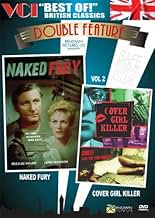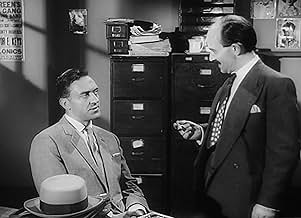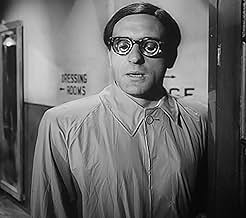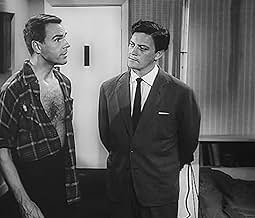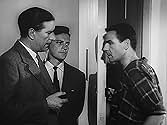अपनी भाषा में प्लॉट जोड़ेंSet in the sleazy world of a backstreet 1950s nightclub, a serial killer is believed to be murdering the models of a glamour magazine.Set in the sleazy world of a backstreet 1950s nightclub, a serial killer is believed to be murdering the models of a glamour magazine.Set in the sleazy world of a backstreet 1950s nightclub, a serial killer is believed to be murdering the models of a glamour magazine.
Frank Barringer
- Detective
- (बिना क्रेडिट के)
फ़ीचर्ड समीक्षाएं
Spencer Teakle is a stage door Johnny with the shyest manner. He claims to be a journalist for "WOW!", one of those magazines whose sales depend more on pretty, underdressed women on the cover than their prose. Show girl Felicity Young doesn't believe him for an instant. She's right. He's actually the publisher of the magazine, left him by his uncle, who thought the repressed archeologist needed to broaden his interests.
Then the girl on the most recent cover dies of a sleeping pill overdose, wearing the same costume. Teakle digs through the back files and discovers other recent cover girls have died in the same way. Police Inspector victor Brooks thinks they're dealing with the sort of serial killer that he cannot catch: not only insane, but highly intelligent.
Given the premises of this movie, I was surprised at its intelligence and competence. Of course, it's fun to look at the series of young ladies wearing sexy clothes and little of them, but an unrecognizable Harry Corbett as the killer has a great role, and Teakle seems to be having a lot of fun. Good script, good direction, good acting: they combine to make a very good movie.
Then the girl on the most recent cover dies of a sleeping pill overdose, wearing the same costume. Teakle digs through the back files and discovers other recent cover girls have died in the same way. Police Inspector victor Brooks thinks they're dealing with the sort of serial killer that he cannot catch: not only insane, but highly intelligent.
Given the premises of this movie, I was surprised at its intelligence and competence. Of course, it's fun to look at the series of young ladies wearing sexy clothes and little of them, but an unrecognizable Harry Corbett as the killer has a great role, and Teakle seems to be having a lot of fun. Good script, good direction, good acting: they combine to make a very good movie.
A wonderful gem of sleazy 1960s London with a brilliant performance from the wonderfully versatile Harry H Corbett in a very dark interesting turn as a Serial killer
A weirdo approaches the stage door of the Casbah Club, in 1950s Soho, and is transfixed by a portrait of Miss Gloria Starke (Bernadette Milnes, who pops up in the opening scene of Cover Story, a Sweeney episode, fifteen years later - if you're interested, like).
This is a film by Butchers Film Distributors (at least, I think it is IMDb lists it as Jack Parsons Productions) and it's a film on a different level, theme wise, to almost every other second feature of its era. Cover Girl Killer is a film about a voyeur (in this most voyeuristic art form) who becomes a serial killer in order to "give man back his dignity, to free him from the prison of lustful images which foul his mind and pollute his sanity." The killer, played by Harry H Corbett, and billed only as The Man, feels imprisoned by society's values (which he finds morally abhorrent) and can only become "free" by killing girls who take off their clothes for Wow! Magazine. "I assure you, miss, your nudity means nothing to me", says Corbett, before dispatching one of them, Christina Gregg, who often popped up as the vulnerable type.
I've always had a problem with Corbett in a straight roll (Harry not Ronnie); his acting is just ludicrously mannered really bad, oo I can act, look at me, amateur dramatics. Here, fortuitously, he's playing such an oddball that he's actually quite effective. Of course, the killer doesn't think he's doing anything wrong. "The borderline between what we call insanity and a hyper sensitive intellect is not always very clear, inspector", he tells Inspector Brunner (Victor Brooks), after turning up in his office, pretending to be Mr. Fairchild, property developer. Why he does this is not clear. Maybe, it's an ego thing and he wants to pit his wits against the police.
The most interesting scene is when the killer approaches Lennie Ross, (Theatre, Screen and TV agent, 3rd floor), for an actor to play the killer in the cover girl case. "Surely sex and horror are the new gods in this polluted world of so called entertainment?" (This line later featured in a UK number 1 smash for Frankie Goes To Hollywood, pop pickers.) Here, Cover Girl Killer really gets to the heart of the matter; reflecting on itself as we watch plans for a film version of the film we are actually watching.
This is a film by Butchers Film Distributors (at least, I think it is IMDb lists it as Jack Parsons Productions) and it's a film on a different level, theme wise, to almost every other second feature of its era. Cover Girl Killer is a film about a voyeur (in this most voyeuristic art form) who becomes a serial killer in order to "give man back his dignity, to free him from the prison of lustful images which foul his mind and pollute his sanity." The killer, played by Harry H Corbett, and billed only as The Man, feels imprisoned by society's values (which he finds morally abhorrent) and can only become "free" by killing girls who take off their clothes for Wow! Magazine. "I assure you, miss, your nudity means nothing to me", says Corbett, before dispatching one of them, Christina Gregg, who often popped up as the vulnerable type.
I've always had a problem with Corbett in a straight roll (Harry not Ronnie); his acting is just ludicrously mannered really bad, oo I can act, look at me, amateur dramatics. Here, fortuitously, he's playing such an oddball that he's actually quite effective. Of course, the killer doesn't think he's doing anything wrong. "The borderline between what we call insanity and a hyper sensitive intellect is not always very clear, inspector", he tells Inspector Brunner (Victor Brooks), after turning up in his office, pretending to be Mr. Fairchild, property developer. Why he does this is not clear. Maybe, it's an ego thing and he wants to pit his wits against the police.
The most interesting scene is when the killer approaches Lennie Ross, (Theatre, Screen and TV agent, 3rd floor), for an actor to play the killer in the cover girl case. "Surely sex and horror are the new gods in this polluted world of so called entertainment?" (This line later featured in a UK number 1 smash for Frankie Goes To Hollywood, pop pickers.) Here, Cover Girl Killer really gets to the heart of the matter; reflecting on itself as we watch plans for a film version of the film we are actually watching.
There are some surprisingly long well-informed reviews of this seemingly rather undistinguished 1959 British B. Those who might have seen it at that time are now all senior citizens. But for a few, perhaps a very few, such elderly gentlemen it evokes memories of their formative years like nothing else.
If you had been a young person with an interest in photography you would have been aware of the publications safely tucked away on the top shelves of the newsagents shops - as appear in this film. Soho was then as now an exotic location well known for the fleshly pleasures including foreign foods. Indeed it was a basket of exotica quite unique in the entire UK. Oddly at the same time, it was the home of army surplus radio gear - all displayed on stalls outside the shops. It thus drew serious studious radio amateurs old and young to briefly share its busy notorious pavements with its more permanent and mostly female residents as well as passing rather furtive older gentlemen in raincoats and often bowler hats whose visit might only be slightly longer than that of the innocent old and young radio enthusiasts.
By the standards on the 1950s, the above would be quite unsuitable for any kind of family publication or family conversation as it alludes to what was common knowledge but then a taboo topic in family contexts. Such were the dim and distant 1950s - made vivid again by this film whose makers clearly knew their market.
Did I see it at the time? I'm not sure - it would have been at least an A possibly an X certificate. Yet Felicity Young seems oddly very familiar. Why was she so memorable? Not just because she was very good looking. I think because she was a classy ostensibly "nice" girl who did - remove her clothes, not all of course. In a world then firmly divided between nice girls who didn't and not nice girls who did, Felicity Young produced a thrilling confusion in a younger impressionable mind - apparently.
It is a strange thing that less can be more. In such restricted times, very little could seem very much more.
If you had been a young person with an interest in photography you would have been aware of the publications safely tucked away on the top shelves of the newsagents shops - as appear in this film. Soho was then as now an exotic location well known for the fleshly pleasures including foreign foods. Indeed it was a basket of exotica quite unique in the entire UK. Oddly at the same time, it was the home of army surplus radio gear - all displayed on stalls outside the shops. It thus drew serious studious radio amateurs old and young to briefly share its busy notorious pavements with its more permanent and mostly female residents as well as passing rather furtive older gentlemen in raincoats and often bowler hats whose visit might only be slightly longer than that of the innocent old and young radio enthusiasts.
By the standards on the 1950s, the above would be quite unsuitable for any kind of family publication or family conversation as it alludes to what was common knowledge but then a taboo topic in family contexts. Such were the dim and distant 1950s - made vivid again by this film whose makers clearly knew their market.
Did I see it at the time? I'm not sure - it would have been at least an A possibly an X certificate. Yet Felicity Young seems oddly very familiar. Why was she so memorable? Not just because she was very good looking. I think because she was a classy ostensibly "nice" girl who did - remove her clothes, not all of course. In a world then firmly divided between nice girls who didn't and not nice girls who did, Felicity Young produced a thrilling confusion in a younger impressionable mind - apparently.
It is a strange thing that less can be more. In such restricted times, very little could seem very much more.
Harry H Corbett won acclaim as a stage actor early in his career but in 1962 he appeared on television for a 'one-off' Galton and Simpson Playhouse called 'The offer'. This was successful enough for Galton and Simpson to be asked to turn it into a series which they called Steptoe and Son. This was so popular that it ran for eight series ending in 1974.
Most people will only know Harry H Corbett for his portrayal of Harold Steptoe in Steptoe and Son. The quality of these performances, especially the little monologues and character sketches that were often included in the beginning of some of the later episodes, give an insight into the potential he had which was never realised.
Sadly, after 12 years as Harold Steptoe, Harry H Corbett was irredeemably typecast and found little serious dramatic work before his untimely death from a heart attack in 1982.
In Cover Girl Killer he is almost unrecognisable and his (believable) character could not be much further from his later typecasting.
This film is slightly clichéd but is worth seeing in its own right. However, I would advise anyone who has enjoyed Harry H Corbett in anything else to watch this if only to see what we missed of a potentially great dramatic career.
Most people will only know Harry H Corbett for his portrayal of Harold Steptoe in Steptoe and Son. The quality of these performances, especially the little monologues and character sketches that were often included in the beginning of some of the later episodes, give an insight into the potential he had which was never realised.
Sadly, after 12 years as Harold Steptoe, Harry H Corbett was irredeemably typecast and found little serious dramatic work before his untimely death from a heart attack in 1982.
In Cover Girl Killer he is almost unrecognisable and his (believable) character could not be much further from his later typecasting.
This film is slightly clichéd but is worth seeing in its own right. However, I would advise anyone who has enjoyed Harry H Corbett in anything else to watch this if only to see what we missed of a potentially great dramatic career.
क्या आपको पता है
- ट्रिवियाIn 1984, the band Frankie Goes to Hollywood paraphrased one of The Man's lines "Are we living in a land, where sex and horror are the new Gods?" for their song "Two Tribes".
- गूफ़Spencer Teakle manages to arrive at the stage door of the theatre where Felicity Young is being held captive after having left the police station just seconds before.
- भाव
[Gloria is informed that she'll need to work all night and into the next morning]
Gloria Starke: Ten o'clock? I shall be dead!
[smash cut to her lying dead on the ground]
- कनेक्शनFeatured in Truly, Madly, Cheaply!: British B Movies (2008)
टॉप पसंद
रेटिंग देने के लिए साइन-इन करें और वैयक्तिकृत सुझावों के लिए वॉचलिस्ट करें
विवरण
- चलने की अवधि
- 1 घं 1 मि(61 min)
- रंग
- पक्ष अनुपात
- 1.37 : 1
इस पेज में योगदान दें
किसी बदलाव का सुझाव दें या अनुपलब्ध कॉन्टेंट जोड़ें

